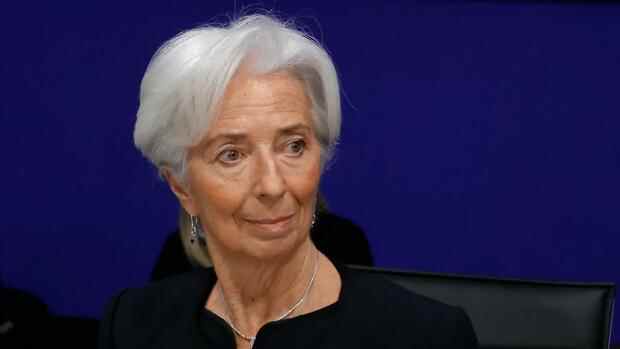The head of the ECB must once again master a difficult balancing act.
(Photo: Polaris/laif)
Frankfurt Despite the further rise in inflation, leading central bankers are signaling a more cautious course in tightening monetary policy. ECB chief economist Philip Lane warned in Berlin on Wednesday evening that the European Central Bank should not react hastily to the skyrocketing inflation.
The head of the US Federal Reserve, Jerome Powell, also expressed reluctance to take further steps at a congressional hearing on Wednesday. He wants to hold on to a rate hike in March, but only by a quarter of a percentage point. A stronger increase, on the other hand, seems off the table.
The central banks are in a difficult position. Inflation has recently turned out to be significantly higher than expected. In February it rose to 5.8 percent in the euro area, and in the USA the consumer price index rose by 7.5 percent at the beginning of the year. The sanctions against Russia and the increase in energy and raw material prices are now threatening an additional price surge.
Actually, the high inflation would argue for a quick tightening of monetary policy. But the consequences of the war in Ukraine could also damage the economy – especially in the euro zone. This is more closely intertwined with Russia through trade and relies on energy imports from there.
Top jobs of the day
Find the best jobs now and
be notified by email.
The chief economist at the International Banking Federation (IIF), Robin Brooks, expects monetary policy in the US and Europe to diverge even more as a result. Until recently, many experts assumed that the ECB would decide to end its net bond purchases more quickly at its meeting next week. In December she had decided that these should continue indefinitely. An end to net purchases is considered a prerequisite for a rate hike.
According to the minutes of the February ECB meeting, which took place before the start of the war in Ukraine, there was broad agreement at the time that a gradual normalization of monetary policy was appropriate. According to the minutes published on Thursday, the council members also spoke about the fact that the conditions for a turnaround in interest rates could possibly be met earlier. But it is now unclear whether this will happen.
In principle, the central bank has two options. First, it could still decide to end net purchases earlier this year. In this case, however, it would probably dampen speculation about a rate hike soon thereafter. Secondly, she could for the time being completely dispense with such a step.
ECB chief economist Lane sees rising energy prices as a negative supply shock. In such a case, in his view, the period of time before inflation returns to the target level of two percent could be extended in order to avoid severe damage to the economy. The head of the Finnish central bank, Olli Rehn, and ECB director Fabio Panetta have also urged patience over the past few days in view of the unforeseeable consequences of the war in Ukraine.
Powell wants to stick to rate hike
Bundesbank President Joachim Nagel, on the other hand, emphasized this week: “We must keep an eye on the normalization of our monetary policy.” Portuguese central bank chief Mario Centeno warned of stagflation in Europe, i.e. a combination of economic stagnation and high inflation.
The ECB’s decision next week is also likely to depend on its new inflation forecasts, which it then presents. Experts expect these to be even higher than in December. At that time, the central bank assumed that inflation in the euro area would be 1.8 percent in 2023 and 2024 – and thus below the target of two percent.
>>> Read here: Ex-Fed Bill Dudley: “The Fed is about five rate hikes late”
The economic consequences of the war are likely to be less felt in the USA than in Europe. They are not dependent on energy imports, which means that the economic damage caused by the sharp rise in oil and gas prices is less.
Powell stated that he wants to hold on to a rate hike when the central bankers meet in two weeks. “I’m inclined to suggest and support a 25 basis point rate hike,” the US Federal Reserve chairman said.
But he also announced that the Fed would act very cautiously because of the war in Ukraine and the unpredictable consequences for the global economy. “We need to respond quickly to incoming data and the evolving outlook.”
More: “Stagflation shock of epic proportions” – Inflation in the euro area rises to 5.8 percent.

